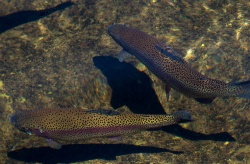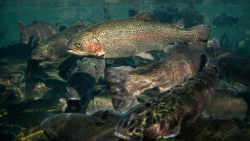
Factors like physical activity and diet play a fundamental role in the regulation of key biological functions, including metabolism and antioxidant responses. This is true not only for humans but for vertebrate animals as well.
At least, this is the conclusion from several studies conducted on aquaculture fish, which have demonstated that moderate exercise has benefits for their welfare and health.
A new study by researchers at Istanbul University in Turkey found that swimming activity and controlled feeding in young trout significantly impacted the activities of antioxidant and digestive enzymes.
The explain that regular, controlled exercise, as shown by science, can improve nutrient use efficiency and activate the antioxidant defense system, which is important for countering oxidative stress caused by increased metabolism during exercise. On the other hand, controlled feeding, often used to simulate natural scarcity and manage tissue quality, could have both beneficial and adverse effects.
This research is highly significant in developing more effective and sustainable aquaculture practices that not only enhance production but also ensure the welfare of farmed fish.
Experimental design
The experimental design included creating four distinct groups of fish, each subjected to different water flow and feeding regimes.
One group of fish was kept in still water, with no currents, and fed to satiety, which generally represent 2% of their body weight daily. This group served as the control.
Another group was maintained in still water with a 25% reduction in feed compared to the control group. This setup aimed to assess the effects of reduced intake in fish without physical activity.
The third group was subjected to a current speed equivalent to one body length per second and fed to satiety. This was to examine the effects of physical exercise on the physiology and metabolism of the fish without dietary restriction.
The fourth group engaged in swimming exercise in conditions with a current of one body length per second and a 25% reduction in feed. Here, both exercise and controlled feeding were combined.
Moderate exercise is beneficial; controlled feeding has mixed effects
Generally speaking, the findings indicate that while exercise can positively affect the fish’s antioxidant system, controlled feeding may reduce these benefits, and in combination with exercise, it could even be harmful.
These results highlight the importance of a proper balance between diet and exercise in managing the health and growth of rainbow trout in aquaculture systems.
This approach allowed researchers not only to evaluate the individual physiological responses of the fish to each condition but also to compare the groups to gain a boarder understanding of how these management practices could be optimized in a production environment.
As the researchers point out, the experiment reflects an effort to gain a deeper understanding of the underlying mechanisms that regulate the health of rainbow trout, with the aim of enhancing aquaculture strategies to promote healthy and sustainable growth. The expected results could provide practical recommendations on exercise intensity and feeding levels, offering guidelines to improve farming practices in terms of efficiency and environmental sustainability.
Reference:
Tunçelli, G., Ertik, O., Bayrak, B. B., Memiş, D., & Yanardag, R. (2024). Effects of swimming activity and feed restriction on antioxidant and digestive enzymes in juvenile rainbow trout: Implications for nutritional and exercise strategies in aquaculture. Veterinary Medicine and Science, 10, e1466




